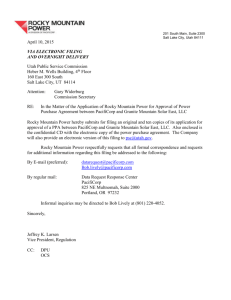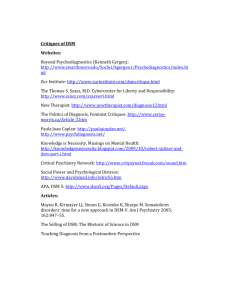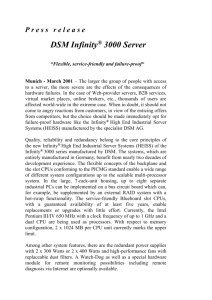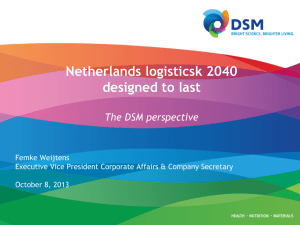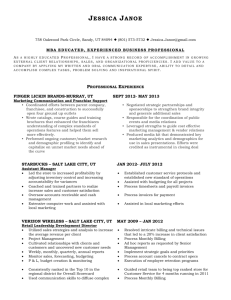Rocky Mountain Power`s Proposal for Scope of Phase II Proceedings
advertisement
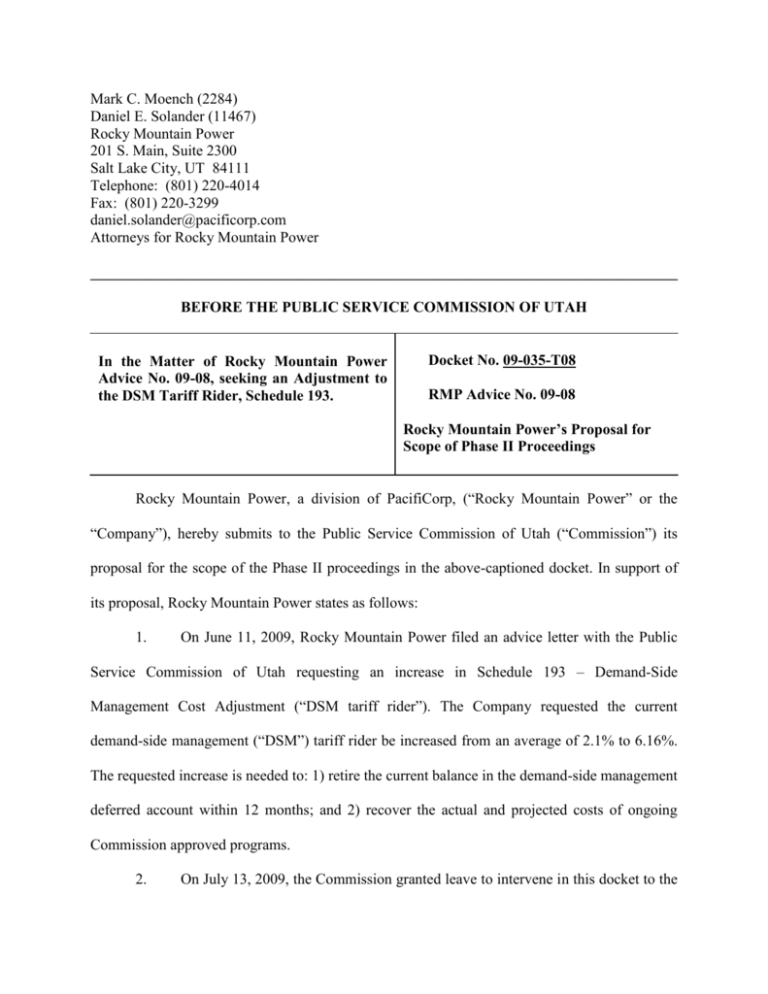
Mark C. Moench (2284) Daniel E. Solander (11467) Rocky Mountain Power 201 S. Main, Suite 2300 Salt Lake City, UT 84111 Telephone: (801) 220-4014 Fax: (801) 220-3299 daniel.solander@pacificorp.com Attorneys for Rocky Mountain Power ______________________________________________________________________________ BEFORE THE PUBLIC SERVICE COMMISSION OF UTAH Docket No. 09-035-T08 In the Matter of Rocky Mountain Power Advice No. 09-08, seeking an Adjustment to the DSM Tariff Rider, Schedule 193. RMP Advice No. 09-08 Rocky Mountain Power’s Proposal for Scope of Phase II Proceedings Rocky Mountain Power, a division of PacifiCorp, (“Rocky Mountain Power” or the “Company”), hereby submits to the Public Service Commission of Utah (“Commission”) its proposal for the scope of the Phase II proceedings in the above-captioned docket. In support of its proposal, Rocky Mountain Power states as follows: 1. On June 11, 2009, Rocky Mountain Power filed an advice letter with the Public Service Commission of Utah requesting an increase in Schedule 193 – Demand-Side Management Cost Adjustment (“DSM tariff rider”). The Company requested the current demand-side management (“DSM”) tariff rider be increased from an average of 2.1% to 6.16%. The requested increase is needed to: 1) retire the current balance in the demand-side management deferred account within 12 months; and 2) recover the actual and projected costs of ongoing Commission approved programs. 2. On July 13, 2009, the Commission granted leave to intervene in this docket to the Utah Association of Energy Users (“UAE”), the Utah Industrial Energy Consumers (“UIEC”) and Utah Clean Energy. On August 5, 2009 and August 17, 2009, the same was granted to Western Resource Advocates and Southwest Energy Efficiency Project, respectively. 3. On July 14, 2009, the Parties met with Commission staff at a Scheduling and Technical Conference to discuss the scope of the proceeding and to establish a procedural schedule. At that meeting, the Parties agreed to bifurcate the proceeding to evaluate the Company’s immediate recovery of the balance in the demand-side management deferred account and ongoing DSM expenditures in Phase I of the proceeding, and defer all other issues to Phase II, the scope of which will be determined by the Commission at a later date. 4. As a result of settlement negotiations, the Parties reached a compromise on immediate cost recovery and certain other issues, and filed with the Commission on August 3, 2009 a Stipulation resolving the Phase I issues described in paragraph 1 above, including an agreement that Rocky Mountain Power’s DSM tariff rider should be increased to an average rate of 4.6%, effective September 1, 2009. 5. In their initial protests, UAE and UIEC raised a number of issues the parties agreed to defer for potential consideration during Phase II. In its filing, UIEC requested that the Commission: (1) consider proposals for an appropriate DSM tariff rider opt out provision; (2) review the cost effectiveness of the Company’s present DSM programs; and (3) examine the prudency of the Company’s decision to continue offering DSM programs in the face of changing load and price characteristics. In its Protest, UAE requested that the Commission: (1) conduct a review of existing and planned DSM programs, including the cost-effectiveness and appropriate spending caps for each program; and (2) conduct a thorough review of and appropriate adjustments to the DSM cost recovery mechanisms and associated procedures. 6. Rocky Mountain Power believes that UAE’s and UIEC’s proposals to review the cost effectiveness of the Company’s existing DSM programs are unwarranted and should not be addressed in Phase II. The Commission has existing guidelines in place which are used in determining the cost effectiveness of the Company’s DSM programs.1 Pursuant to those guidelines, all new DSM programs and modifications to existing programs proposed by the Company are reviewed for cost effectiveness by the Commission prior to their approval and implementation. If UAE and UIEC wished to challenge the cost effectiveness of the Company’s DSM programs, the dockets in which those programs were approved was the proper forum and time to do so. The Commission determined in those dockets, based on the evidence presented by all parties, that each of Rocky Mountain Power’s existing DSM programs were prudent and just and reasonable. Allowing for the review of the Company’s DSM programs in this proceeding is duplicative to the efforts that occurred at the time that the Commission approved the programs. In addition, the Company provided the cost effectiveness results of its DSM portfolio for calendar year 2008 in Table 2 in Advice No. 09-08. As demonstrated in this table, the Company’s DSM portfolio for 2008 was demonstrated to be cost effective by each test prescribed under the Commission approved DSM evaluation guidelines. Furthermore, the Company has agreed to provide on an ongoing basis DSM cost effectiveness results on a portfolio and program level in an annual report on Utah DSM program performance to be filed with the Commission and provided to the DSM Advisory Group each March 31 following the calendar year reporting period. 7. On April 27, 2009, the Company filed proposed revisions to the cost effectiveness guidelines established in Docket No. 92-2035-04, pursuant to the Commission’s order in Docket 1 See Docket No. 92-2035-04 No. 07-035-T04.2 The proposed revisions represent a collaborative effort of the Utah DSM Advisory Group. If the Commission determines that further review of the cost effectiveness guidelines are appropriate, the Company believes the review should take place as part of Docket No. 07-035-T04. 8. Because Rocky Mountain Power remains in a resource deficit position, the Company believes it is prudent to acquire cost effective DSM resources. While we understand that caps on costs or participation can control short-term program expenses, such caps will limit the amount of cost effective DSM load and energy reductions the Company will be able to acquire. Further, limiting the amount of cost effective DSM that the Company is able to acquire will challenge the Company’s ability to achieve the energy efficiency goals for the State of Utah set forth in the Executive Order entitled Improving Energy Efficiency signed by Governor Jon Huntsman on May 30, 2006, which states it is the policy of the State of Utah to increase energy efficiency by 20% by 2015, and in the Joint Resolution on Cost Effective Energy Efficiency and Utility Demand Side Management enacted in the 2009 Legislative Session in which the Legislature expressed support for cost effective energy efficiency and load management programs for customers of Rocky Mountain Power and encouraged the setting of an electricity savings goal designed to reduce projected electric sales of Rocky Mountain Power by an amount equal to not less than 1 percent of its annual retail sales. 9. Rocky Mountain Power believes also that UIEC’s proposal to examine the prudency of the Company’s decision to continue DSM programs in the face of changing load and price characteristics is contrary to all direction the Company has received from the State of Utah and the Commission and should not be considered in Phase II of this proceeding. As referenced earlier in paragraph 8, the Governor of the State of Utah and the Legislature are supportive of 2 As of August 18, 2009, the Commission has not issued an order on the proposed revisions filed on April 27, 2009. cost effective energy efficiency and load management programs and setting energy efficiency goals for the State and the Company, of which the Company’s DSM programs are an integral part. Further, section 63M-4-303(1)(f) of the Utah Code states that it is the policy of the State of Utah to pursue energy conservation, energy efficiency, and environmental quality. And as stated in paragraph 8, the Company remains in a resource deficit position and believes the continued acquisition of cost effective DSM resources is an effective and necessary component in reducing the resource gap. Finally, DSM resources are long-term in nature and require constant promotion and presence to ensure customer awareness and participation. Starting and stopping program services and imposing caps on programs are disincentives to the customers, local retailers, builders, and trade associations that are all integral to the success of state and utility DSM programs. 10. In its Petition to Intervene, UIEC also requests that the Commission consider allowing customers the opportunity to opt-out of the Company’s DSM tariff rider in light of Senate Bill 202 (2008), which provides that the Commission must implement a process for the issuance, monitoring, accounting, transferring and use of renewable energy certificates (“REC”). The Company believes that consideration of this issue should be deferred to the docket to be designated by the Commission to consider implementation of Senate Bill 202. 11. Rocky Mountain Power does believe, however, that there are a number of issues that should be reviewed in Phase II, including: Opt-Out Provisions. The Company supports a Commission review and discussion on the legality and equity of large customers opting out of funding the acquisition of, through utility programs, least cost demand side resources. As part of this discussion, the company supports dialogue on possible revisions to the self-direction program. Recovery Mechanisms. The Company supports a review by the DSM Advisory Group of the current mechanism from the view of all stakeholders, while ensuring any changes going forward do not create utility disincentives. In addition, the Company supports the review of utility performance incentives in Phase II. WHEREFORE, Rocky Mountain Power respectfully requests the Commission limit Phase II of this proceeding to a discussion and evaluation of the issues outlined above. DATED: August 18, 2009. Respectfully submitted, ___________________________ Mark C. Moench Daniel E. Solander Rocky Mountain Power CERTIFICATE OF SERVICE I hereby certify that on this 18th day of August, 2009, I caused to be emailed a true and correct copy of the foregoing COMMENTS OF ROCKY MOUNTAIN POWER REGARDING THE SCOPE OF ISSUES TO BE CONSIDERED IN PHASE II PROCEEDINGS in Docket No. 09-035-T08 to the following: F. Robert Reeder William J. Evans Vicki M. Baldwin Parsons Behle &, Latimer 201 South Main Street, Suite 1800 Salt Lake City, Utah 84111 FRReeder@parsonsbehle.com bevans@,parsonsbehle.com vbaldwin@narsonsbehle.com Michele Beck Cheryl Murray Office of Consumer Services 160 East 300 South, 2nd Floor Salt Lake City, UT 84111 cmurray@utah.gov mbeck@utah.gov Paul Proctor Utah Office of Consumer Services Heber M. Wells Bldg., Fifth Floor 160 East 300 South Salt Lake City, UT 84111 pproctor@utah.gov Gary A. Dodge Hatch James & Dodge 10 West Broadway, Suite 400 Salt Lake City, UT 84101 gdodge@hjdlaw.com Philip Powlick William Powell Division of Public Utilities Heber M. Wells Building 160 East 300 South, 4th Floor Salt Lake City, UT 84111 wpowell@utah.gov philippowlick@utah.gov Michael Ginsberg Patricia Schmid Assistant Attorney General Utah Division of Public Utilities Heber M. Wells Bldg., Fifth Floor 160 East 300 South Salt Lake City, UT 84111 mginsberg@utah.gov pschmid@utah.gov Lowry Brown Western Resource Advocates 2260 Baseline Rd., Suite 200 Boulder CO 80302-7740 lbrown@westernresources.org Betsy Wolf Salt Lake Community Action Program 764 South 200 West Salt Lake City, Utah 84101 bwolf@slcap.org Sarah Wright Executive Director Utah Clean Energy 1014 2nd Avenue Salt Lake City, UT 84103 sarah@utahcleanenergy.org kevin@utahcleanenergy.org Steven S. Michel Western Resource Advocates 2025 Senda de Andres Santa Fe, NM 87501 smichel@westernresources.org nkelly@westernresources.org Holly Rachel Smith, Esq. Russell W. Ray, PLLC 6212-A Old Franconia Road Alexandria, VA 22310 holly@raysmithlaw.com Steve W. Chriss Wal-Mart Stores, Inc. 2001 SE 10th Street Bentonville, AR 72716-0550 stephen.chriss@wal-mart.com Howard Geller Executive Director Southwest Energy Efficiency Project (SWEEP) 2260 Baseline Rd. #212 Boulder, CO 80302 hgeller@swenergy.org Mark C. Moench Jeffrey K. Larsen Carol Hunter David L. Taylor Jeff Bumgarner Daniel Solander Aaron Lively Rocky Mountain Power 201 S. Main Street, Suite 2300 Salt Lake City, UT 84111 mark.moench@pacificorp.com jeff.larsen@pacificorp.com carol.hunter@pacificorp.com dave.taylor@pacificorp.com jeff.bumgarner@pacificorp.com daniel.solander@pacificorp.com aaron.lively@pacificorp.com
